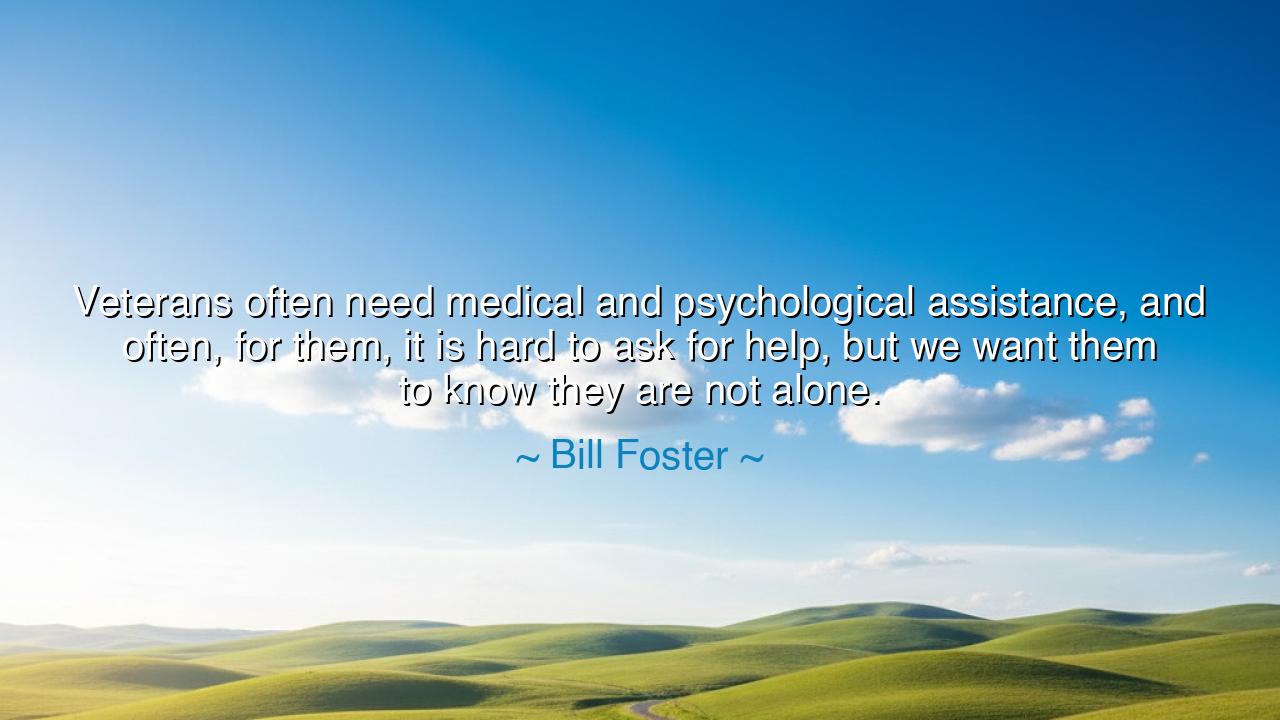
Veterans often need medical and psychological assistance, and
Veterans often need medical and psychological assistance, and often, for them, it is hard to ask for help, but we want them to know they are not alone.






Hear the words of Bill Foster, who lifts his voice for those who once bore the weight of battle: “Veterans often need medical and psychological assistance, and often, for them, it is hard to ask for help, but we want them to know they are not alone.” In these words is compassion joined with truth. He names the veteran, the warrior returned from the field, who carries not only scars upon the flesh but also wounds within the mind and spirit. He acknowledges their silence, their reluctance to ask, their hidden pain—and he calls out with a message of fellowship: you are not alone.
From the earliest days of war, this has been the tragedy of the soldier: that though they fight in company, they suffer in solitude. The ancients knew this well. When Odysseus returned from Troy, he found not peace but restlessness, haunted by trials and loss. Though honored as a hero, he carried sorrow within him. So too today, the modern veteran walks with burdens unseen: memories of comrades fallen, of horrors witnessed, of a body pushed beyond its limits. Medical and psychological assistance become as vital as food and water, for without them the spirit falters.
Yet, as Foster declares, it is hard to ask for help. For the soldier has been trained to endure, to press on without complaint, to cloak weakness beneath discipline. To seek aid may feel like betrayal of that training, like surrender. Thus many remain silent, choosing isolation over relief. And in that silence, wounds deepen. Foster’s words pierce this silence, reminding us all that true courage lies not only in battle, but in the humility to reach for healing.
History gives us countless reminders of this truth. After the Great War of 1914, millions of men returned home broken in body and mind. They called it “shell shock,” for they did not yet have words like post-traumatic stress. Many were dismissed as weak or unstable, left to suffer in shadows. But as time passed, the world learned to see their pain as real and deserving of care. Out of that recognition grew systems of support, though imperfect, meant to heal not only the soldier’s body but also the soldier’s spirit.
The meaning of Foster’s words is therefore both heroic and tender. They honor the sacrifice of veterans, affirming that their struggle does not end when the battle is done. They remind us that asking for help is not shameful, but noble. And they call upon society—families, neighbors, nations—to step forward with open hands, ensuring that those who once defended the many are themselves defended in times of need.
The lesson for us is clear: let us not leave the warriors to fight their private wars alone. Let us speak with compassion, listen with patience, and extend aid without waiting to be asked. If you know a veteran, remind them of their worth. If you see one struggling, offer friendship and guidance toward the help they need. And as citizens, let us demand that systems of medical and psychological care be strengthened and honored, for neglect is betrayal, but care is gratitude.
Practical action flows from this teaching. Support veteran programs in your community. Volunteer time to organizations that provide counseling and companionship. Advocate for policies that secure proper healthcare and mental health resources. And in your personal life, learn to recognize the silent signals of pain in those who bear it quietly.
So let Foster’s words be remembered as both comfort and command: comfort to the veteran who suffers in silence, and command to the society that owes them its care. For the battle does not end at the field of war—it continues in the chambers of memory, in the quiet of the night, in the hidden corners of the mind. And no warrior should be left to face that battle alone. This is the teaching handed down, and this is the torch we must carry.






AAdministratorAdministrator
Welcome, honored guests. Please leave a comment, we will respond soon